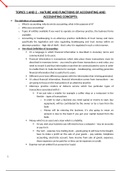Class notes
Accounting for law students
- Institution
- Stellenbosch University (SUN)
notes contain introductory information leading to more in depth module discussions , as the textbook progresses into the specific module , so my notes follow and expand. Providing needed examples and illustrations as the textbook would have.
[Show more]



